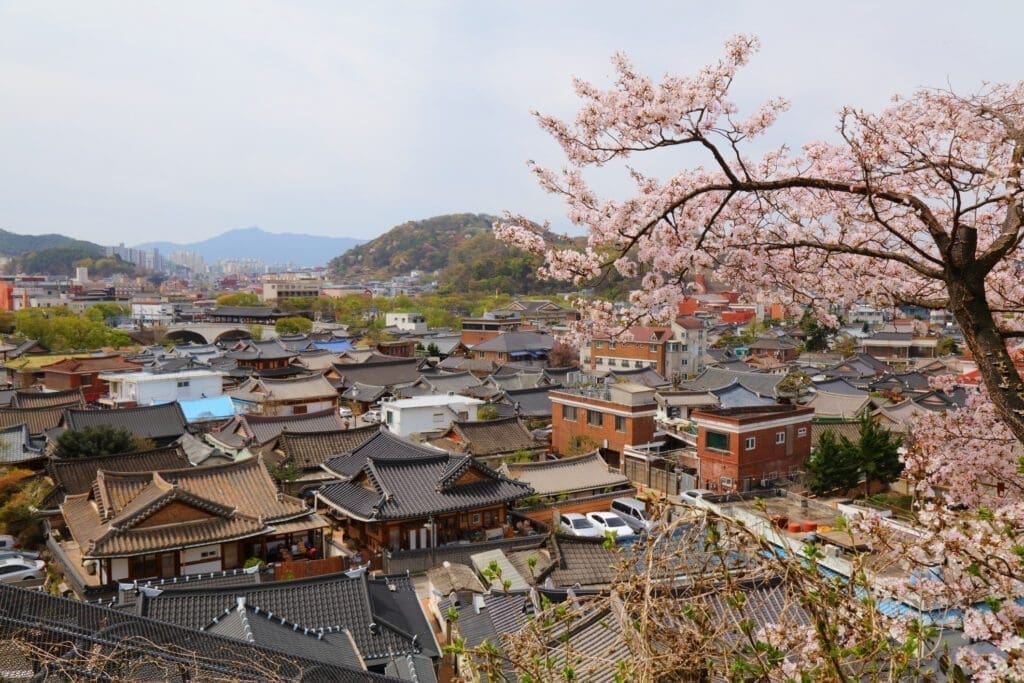Jeonju Hanok Vilage

Jeonju Hanok Village Detailed Description
Jeonju Hanok Village is renowned for its beautifully preserved hanok (traditional Korean houses), which are characterized by elegant wooden frames, curved tiled roofs, and serene courtyards. Many hanok now serve as guesthouses, tea houses, craft shops, and cultural centers, allowing visitors to engage with Korean traditions firsthand.
The village’s vibrant atmosphere is enhanced by its cobblestone streets, art galleries, and street food vendors. Visitors can participate in hands-on activities such as hanbok (traditional clothing) rental, traditional craft-making, and calligraphy workshops.
Jeonju is also the birthplace of bibimbap, one of Korea’s most iconic dishes, making the village a must-visit for food enthusiasts.
Jeonju Hanok Village Historical or Significant Information
- Preservation Effort: Jeonju Hanok Village was designated a protected area in the 1970s to preserve its historical and cultural significance.
- Cultural Hub: The village is part of Jeonju’s larger identity as a city of culture, recognized as a UNESCO Creative City of Gastronomy.
- Confucian Heritage: Key landmarks within the village, such as the Jeonju Hyanggyo Confucian School, reflect Korea’s intellectual and spiritual traditions.
Event and Festival Information
- Jeonju Hanok Village Night Market: A lively market offering traditional food, crafts, and cultural performances.
- Jeonju International Film Festival: Held annually in spring, this event attracts filmmakers and movie enthusiasts from around the world.
- Jeonju Bibimbap Festival: A celebration of Jeonju’s signature dish with cooking contests, food stalls, and cultural performances.
Noteworthy Details
- Hanbok Experience: Rent traditional Korean clothing and stroll through the village for an authentic cultural experience.
- Cultural Workshops: Participate in activities like making hanji (traditional Korean paper), crafting fans, or trying tea ceremonies.
- Traditional Cuisine: Enjoy local delicacies, including Jeonju-style bibimbap, makgeolli (rice wine), and tteokgalbi (grilled short rib patties).
- Night Views: The village transforms at night with soft lighting that highlights the beauty of the hanok roofs and streets.
Practical Information
- Operating Hours:
- Open year-round; individual attractions, shops, and restaurants have varied operating hours, typically from 9:00 AM to 9:00 PM.
- Admission Fees:
- Free to explore the village; fees apply for specific activities, workshops, and museums.
- Transportation:
- From Jeonju Station, take a local bus or taxi to the village (approximately 15 minutes).
- Parking is available at nearby lots for visitors arriving by car.
- Accessibility: The village’s cobblestone streets may pose challenges for wheelchairs and strollers.
Tips for Visitors to Jeonju Hanok Village
- Book a Hanok Stay: Spend a night in a traditional house for a unique and immersive experience.
- Visit During Festivals: Plan your trip around local events to enjoy the village at its liveliest.
- Arrive Early: Mornings are quieter and ideal for taking photos without the crowds.
- Wear Comfortable Shoes: The village requires walking on uneven paths, so comfortable footwear is essential.
Nearby Attractions
- Gyeonggijeon Shrine: A historic site housing portraits of the Joseon Dynasty’s founder, King Taejo.
- Jeonju Nambu Market: A bustling traditional market known for its street food and shopping.
- Omokdae and Imokdae Pavilions: Scenic spots offering panoramic views of the village and surrounding areas.
Official Website
For more details, visit: Visit Jeonju - Hanok Village
